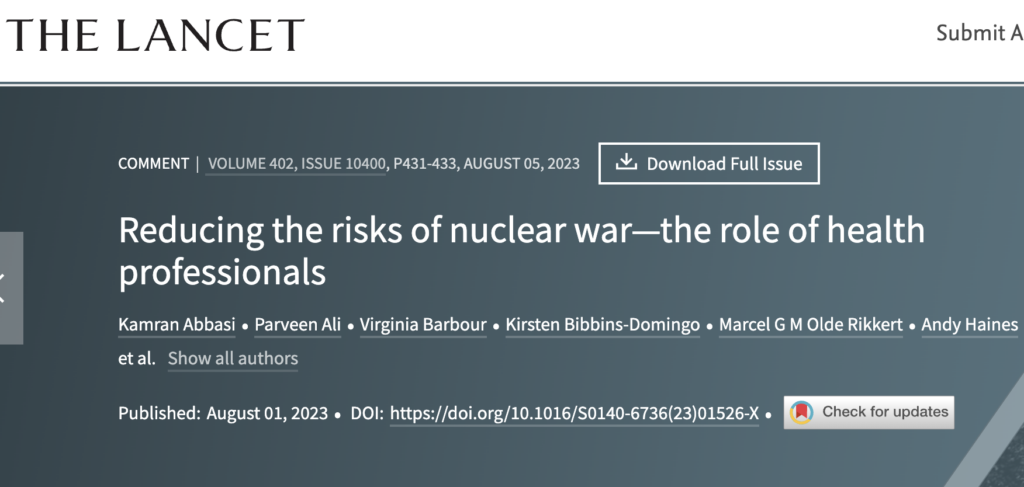Top medical journals call for global action to reduce nuclear war risk
By John Mecklin | August 8, 2023

If 100 respected medical journals all reported that people around the world could do one particular thing to drastically improve their long-term health prospects, I suspect there would be a global rush to get that one thing done. The response might be uneven; some countries would do more to persuade their citizens to take up that particular healthful thing than others. But because medical journals tend to be fact- and data-driven, and because they tend to be restrained and careful in their judgements, healthful-thing programs would likely spring up, almost everywhere.
So it’ll be interesting to see how the leaders of the United States, Russia, China, France, the United Kingdom, India, Pakistan, Israel, and North Korea respond, now that over 100 top medical journals have called for urgent action to reduce the risk of nuclear war. In an editorial appearing in multiple publications—including the esteemed Journal of the American Medical Association, the British Medical Journal, and The Lancet—11 editors of leading medical and health journals and other medical experts have called on health professionals “to alert the public and our leaders to this major danger to public health and the essential life support systems of the planet—and urge action to prevent it.”
“Once a nuclear weapon is detonated, escalation to all-out nuclear war could occur rapidly,” the co-authors wrote. “The prevention of any use of nuclear weapons is therefore an urgent public health priority and fundamental steps must also be taken to address the root cause of the problem—by abolishing nuclear weapons.”
The editorial advocates that the nine nuclear-armed countries and their allies adopt no-first-use policies and take their nuclear weapons off hair-trigger alert. In what could be seen as a reference to Russia, the editorial also urges that countries involved in current conflicts pledge publicly and unequivocally not to use nuclear weapons. In a more ambitious (and potentially more provocative) vein, the piece also proposes that the nuclear-armed nations work toward a definitive end to the nuclear threat through negotiations “for a verifiable, timebound agreement to eliminate their nuclear weapons in accordance with commitments in the [Non-Proliferation Treaty], opening the way for all nations to join the Treaty on the Prohibition of Nuclear Weapons.”
The editorial begins with a reference to the Bulletin’s Doomsday Clock, now set at 90 seconds to midnight, the closest it has ever been to catastrophe, and ends with a ringing call for immediate action to reduce the nuclear threat: “The danger is great and growing. The nuclear armed states must eliminate their nuclear arsenals before they eliminate us. The health community played a decisive part during the Cold War and more recently in the development of the Treaty on the Prohibition of Nuclear Weapons. We must take up this challenge again as an urgent priority, working with renewed energy to reduce the risks of nuclear war and to eliminate nuclear weapons.”
I will report any responses from the leaders of the world’s nuclear-armed nations to this public health advice, as I see them.
Together, we make the world safer.
The Bulletin elevates expert voices above the noise. But as an independent nonprofit organization, our operations depend on the support of readers like you. Help us continue to deliver quality journalism that holds leaders accountable. Your support of our work at any level is important. In return, we promise our coverage will be understandable, influential, vigilant, solution-oriented, and fair-minded. Together we can make a difference.
Keywords: BMJ, JAMA, The Lancet, medical journals, nuclear war
Topics: Nuclear Risk, Nuclear Weapons














